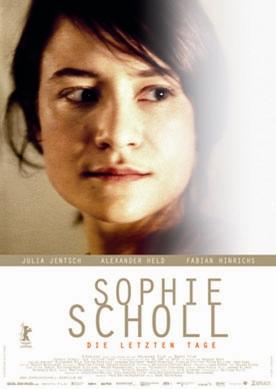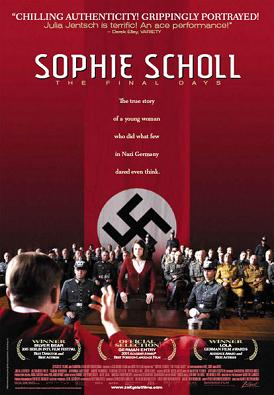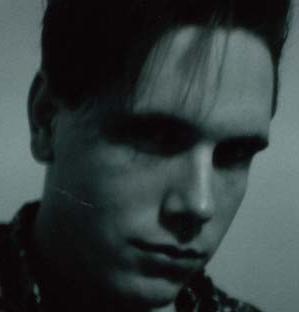Did you ever wonder why there are so many World War II movies out there? It's because there are so many stories to tell. You could make a thousand WW2 films and still not tell every story that needs to be told. But even if you've seen so many that you recognize repetition like the pattern on a corduroy jacket, there's a good chance you haven't seen this one before. This is Sophie Scholl - The Final Days, a German film, made in Germany by Germans about Germans and set during the most frightening and scarred slice of German history.
This isn't the first time that Sophie Scholl has been represented on the screen. Since her execution, Sophie has become something of a national hero, even considering her short time as a dissident. Sophie was a member of the famed Weiße Rose ("White Rose") resistance movement in Germany, a peaceful and small group who worked to bring down the Nazis, and restore their Deutchland to the respectable nation they dreamed of. But peaceful protests in such a police state are a dangerous business, and even the printing of (reverse) propaganda leaflets can lead not only to arrest, but to a death sentence.


|
While the title of Sophie Scholl - The Final Days pretty much leaves the ending of this movie as unambiguous as the ending of Godzilla Versus Bambi, it's a fair bet that there is nothing truly predictable about this film. This story of real German heroes during the holocaust feels more like a stage play than a movie with its dialogue-driven narrative and its muted stage dressing. Director Marc Rothemund has allowed for the story itself to take "center stage" (as it were), using historically accurate, but not completely antiquated clothing to compliment the primarily neutral set, providing an almost timeless quality to the proceedings. This could happen today, or anywhen.
The White Rose has gained many victories in using the German postal service as a means to disseminate the truths most Germans would never see. While Sophie (Julia Jentsch), her brother Hans Scholl (Fabian Hinrichs), and their friends Willi Graf (Maximilian Brückner) and Christoph Probst (Florian Stetter) are proud of their successes, the war-time paper shortage leaves them with a large stack of leaflets, but no means of distribution. Except the one place where free thinking is encouraged... the University. Naturally, such daring gets them both caught and interrogated over the next six days.
What follows is amazing to watch, yet certainly open to the eye of the beholder. Using real court transcripts and actual stenographer notes from Sophie Scholl's interrogation (sealed until 1990) Rothemund and writer Fred Breinersdorfer recreate the days that Sophie endured toward the end of her life, focusing mainly on her dealings with interrogation specialist Robert Mohr (Alexander Held). Where the "black and white" of the official documents might fail is in the humanity of these characters ("humanity" being an abstract thing after all). Here Breinersdorfer and Rothemund have taken the time to interview the now-famed cell mate of Scholl, Else Gebel (sympathetically portrayed here by Johanna Gastdorf), Graf's sister (and fellow detainee) Anneliese Knoop-Graf and no less than the surviving son of Mohr himself (a boy of Sophie's age during the events of this film) Mr. Willy Mohr. How accurate is this to the facts and to the characteristics of these real people? While it's impossible to say for sure, it's arguable that this is as accurate a portrayal as is possible to make in 2005.
The thing that really keeps this film going is Jentsch's award-winning portrayal of Sophie, especially as she spars with Held's Mohr. The strength she shows in the face of the Third Reich is admirable and fascinating. What's more, when Sophie proves herself to be a patriot, we believe this. It truly is Germany that she loves, although it is the Nazi government that she hates, and would die to defeat. German kids are dying in what she deems to be a senseless war and chilling rumors of the Concentration Camps are coming in. In Coptic times such as those, when it was a danger even to stand up, Sophie and the White Rose did much more than that, and continued to until her final day. This film is primarily one of dialogue and conversations (being, at core, a series of long interviews). To keep this from becoming officious and drab it would take two very fine actors. Luckily, we have them, and it's worth every second of listening and every second of subtitle-reading to appreciate the full picture.
The very surprising thing here is the compassion that is displayed, even in those wearing a Nazi pin on their lapel. Let me be very careful with what I'm telling you here, because Rothemund makes no excuses for the Nazis, nor does he shed sympathy on the War Machine, or Hitler and Himmler. In short, he does not whitewash any part of the Reich. Instead, he boldly asks the question: If this were to happen, would everyone in the country immediately become as evil as the Reich? Would the mail men, prison guards, secretaries and even police interrogators suddenly become mindless drones of Queen Bee Adolph? No. These are still human beings caught up in a horrible machine. This shows the courage of Sophie Scholl and her friends all the more brilliantly. The water has boiled, the frogs don't realize their being cooked, but Sophie Scholl has the bravery to say something, to point out that the Emperors have no Souls!
It's a hammer-blow among hammer-blows, cracking away at the Reich during its last breaths, and while the few being swept along with the Nazis may show compassion, the upper brass of the courts and the high Military show nervousness and fear. The Anger shown here is that of a wounded animal, as the Nazis (particularly those who have been to the "Eastern Front") know that some, if not all, of what Sophie says is really the dangerous truth. Mohr knows it as well, and you have to see Held's portrayal to believe it. Conflict shows on his face amid an air of dignity, especially as the subject of his son comes up.
Jentsch is even more amazing, showing an impermeable shell amid horrors, but the true and vulnerable young girl she really is when all alone. Jentsch's portrayal of Sophie Scholl is no less than incredible. She shows her relying on her strong Christian faith to get her through these trials, knowing that none of this is the "easy" thing to do, and knowing just as well that this is the "right" thing to do. She doesn't want to be martyred, she wants to live, and can most often be seen in quiet contemplation looking out of windows to her longed-for freedom. However, she is willing to be martyred, and, when faced with her own mortality is both brave and internally frightened at the same time. Watch the windows, watch her prayers, watch the change that overtakes Jentsch's Sophie the very second a cell door is closed and she is left alone. You won't be sorry you did.
There is nothing "easy" about this film, not even what you should take away from it. Most emotional films of this kind treat their audience as marionettes, pulling the proverbial heart strings in which ever preordained direction they choose. Not this one. While Sophie is the source of our sympathies, there is no "film noir" mood lighting demanding a certain mood, no orchestra hits at poignant lines that scream "pay attention you idiot, this is important", and no simple visual motifs that instruct the viewer. You need to keep your thinking cap on for this mutable, yet imaginative piece. This is a truly European film, but then, to reclaim a history and to show that not all of Germany, then or now, could be boiled down to simply "the Nazis", could a film like this have truly worked as anything but a "German film"?
Not everyone will agree. The screening I attended also had Professional Director of Photography Jack Anderson and the successful producer Alan Jacobs in the crowd. They didn't pan the film, but weren't quite as impressed as I was. However, there were a few in the crowd who had spent time in Germany, or were Germans themselves. They felt much as I do. Four and One Half Stars out of Five for Sophie Scholl - Die letzten Tage, the film about patriotic German Heroes, who fought against the Holocaust, against the Blitzkrieg, and against the Third Reich in a time when, in both Germany and abroad, Heroes were most needed. It's more than a fitting epitaph, it's a realistic tribute to Sophie Scholl. Thank you and God Bless.



 1/2
1/2


